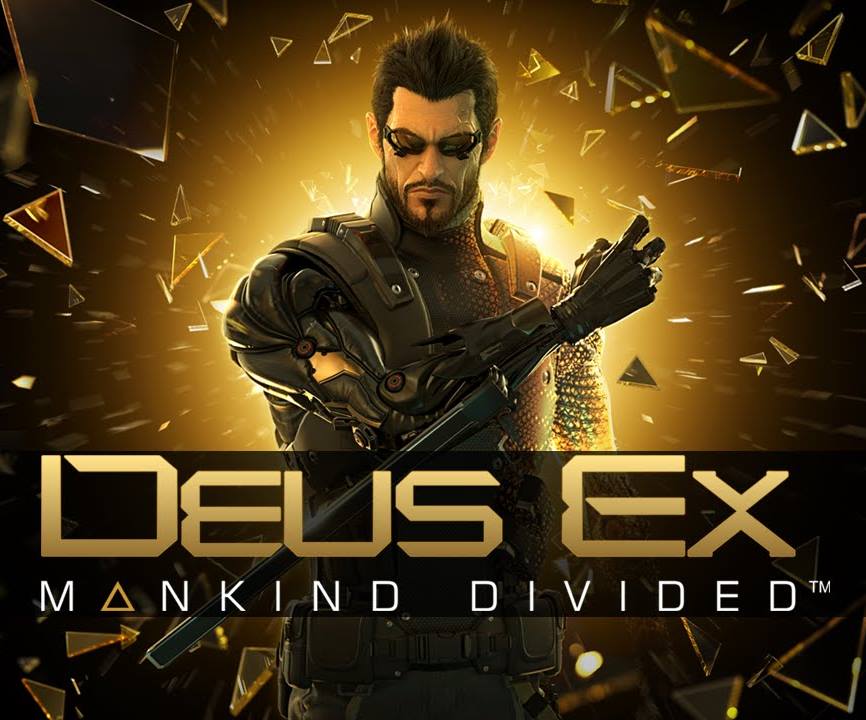Deus Ex: Mankind Divided Review
Any game bearing the Deus Ex name sets a high bar for itself, and yet, Deus Ex: Mankind Divided clears it handily. The followup to Deus Ex: Human Revolution retains the strong gameplay blueprint of choice-driven stealth and RPG elements that defines the series, but its superlative map and mission designs elevate it to new highs.
Mankind Divided’s gorgeously realized version of Prague is deeply infused with meaty, multi-part quests that give you plenty of chances to leverage its toy chest of cool gadgets and abilities. Its story is just slightly limited in scope compared to the far-reaching conspiracies the plot often alludes to, but in terms of raw gameplay, this is the best the series has ever been.LoadingEven more so than its predecessors, this iteration of Deus Ex succeeds in making me feel like a cybernetically enhanced super agent that no security system can withstand. A handful of powerful, sexy new experimental augments that you can wire into grizzled cyborg protagonist Adam Jensen are at least partially to thank for that. The energy-draining Titan Armor ripples angrily as it shrugs off everything from bullets to grenades, the Tesla Arm attachment locks onto and incapacitates multiple targets at range, and when someone absolutely needs to die immediately, the arm-mounted nanoblade launcher pierces flesh and armor alike — knocking its target clean off their feet and pinning the corpse to the nearest wall with tremendous force. They’d almost be too powerful if not for the associated energy and ammo costs that come with them, which are fine-tuned so that I wasn’t too shy to use one, while still feeling a little bit special every time I did.
Prague Is Your Playground
These deviously fun gadgets would be good on their own, but it’s the thoughtfully crafted environments that tease out their true potential. For instance, the Icarus Dash allows you to cover short distances in the blink of an eye, which makes it a fine escape tool. It’s also a great gap-closer for swiftly knocking out guards from a few paces out. But it wasn’t until I started noticing subtle new routes I could take towards objectives that I was sold on it. I once used it to dash across a series of rafters high above an entire roomful of enemies with none of them the wiser. More often, I used it to dash directly from ground level up to a second-story window.LoadingThat particular use synergizes perfectly with the Remote Hacking aug, which is probably the most transformative upgrade. Experimenting with it allows you to manipulate everything from laser grids and mines to ladders and window shutters, opening up whole new possibilities I had no idea were there upon first glance.
But it wasn’t until I started noticing subtle new routes I could take towards objectives that I was sold on it. I once used it to dash across a series of rafters high above an entire roomful of enemies with none of them the wiser. More often, I used it to dash directly from ground level up to a second-story window.LoadingThat particular use synergizes perfectly with the Remote Hacking aug, which is probably the most transformative upgrade. Experimenting with it allows you to manipulate everything from laser grids and mines to ladders and window shutters, opening up whole new possibilities I had no idea were there upon first glance.
What’s the answer? Hint: there isn’t one – there are TEN.
“
Remote hacking a second-floor window shutter and then Icarus Dashing up to it became my favorite one-two punch of stealthy infiltration, granting me easy access to more than a few places where the front door wasn’t an option. This harmonious relationship between mechanics and environmental design extends to the returning augments as well, lending a sense of value and purpose to even the most basic-seeming of upgrades.
Being able to leap, sneak, muscle, or hack my way into almost anywhere wouldn’t mean much if there wasn’t anything there worth discovering, but my feats of high-tech infiltration were always rewarded in one way or another. An innocent-looking curio shop might have a secret passage leading to a storage locker full of valuable items, or sneaking through a neighboring apartment might lead to you stumbling into one of the meaty multi-part sidequests.
It’s a little surprising that Eidos Montreal is willing to allow us to overlook these if we don’t search thoroughly enough, because in terms of complexity and design these optional adventures are no less sophisticated than the main quest-line. You won’t find any simple hit jobs or fetch quests here; these are long-form assignments with lots of moving parts, and they require you to find one of several possible solutions at every step.LoadingThey usually begin simply, with a random email I’d read on a laptop I’d hacked or a shady police officer claiming I didn’t have the proper papers to get through a checkpoint.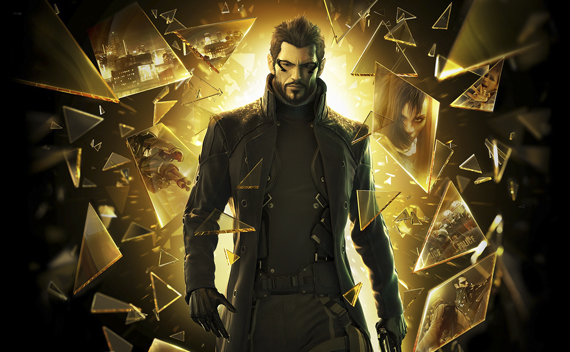 Three steps later I’m breaking up a kidnapping and extortion racket or sneaking into an underground drug lab to put an end to it. Do I have the Social Enhancement aug to convince a lab worker to help me shut down their manufacturing machines? If I don’t, how do I even get to them, seeing as they are gated off by a high fence that’s locked behind a computer keypad with maximum hacking defense? Even if I got past that, there’s arrays of infrared sensors, cameras, and an automated sentry turret all overlapping each other’s sight lines. What’s the answer? Hint: there isn’t one – there are TEN.
Three steps later I’m breaking up a kidnapping and extortion racket or sneaking into an underground drug lab to put an end to it. Do I have the Social Enhancement aug to convince a lab worker to help me shut down their manufacturing machines? If I don’t, how do I even get to them, seeing as they are gated off by a high fence that’s locked behind a computer keypad with maximum hacking defense? Even if I got past that, there’s arrays of infrared sensors, cameras, and an automated sentry turret all overlapping each other’s sight lines. What’s the answer? Hint: there isn’t one – there are TEN.
Missions are meticulously designed, like an interlocking matrix of questions with a bevy of interesting answers.
“
That keypad? You could hack it if you’ve put enough points into that aug, though it would be a crazy hack given how much more interesting the expanded hacking mini-game has become. But with some luck and a healthy stack of the right hacking software, you could pull it off.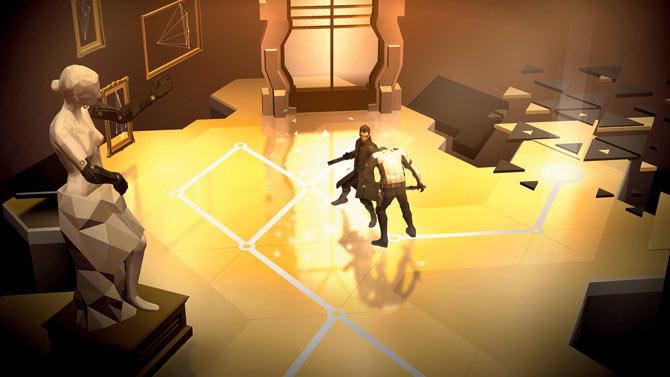 Don’t have the skills or the software? Bust out a multi-tool — a rare one-time-use item that can hack anything in a jiffy. No multi-tool? Craft one with some spare parts. Ah, no spare parts, huh? Did you check that lab assistant’s computer? Oh, you’re hacking is THAT bad? No sweat, just start luring in and knocking out guards until you find one that’s got the code for the keypad on him. Nice work!
Don’t have the skills or the software? Bust out a multi-tool — a rare one-time-use item that can hack anything in a jiffy. No multi-tool? Craft one with some spare parts. Ah, no spare parts, huh? Did you check that lab assistant’s computer? Oh, you’re hacking is THAT bad? No sweat, just start luring in and knocking out guards until you find one that’s got the code for the keypad on him. Nice work!
Except, that was just the keypad. Almost every mission is this meticulously designed, like an interlocking matrix of questions with a bevy of interesting answers…and Mankind Divided never stops asking.
Walking Softly, While Carrying a Big Stick
None of this would work if Mankind Divided weren’t enjoyable to actually play, but developer Eidos Montreal has made many smart improvements to the moment-to-moment experience since Human Revolution. A new cover-to-cover movement system and the ability to mantle up ledges, for instance, make getting around much smoother. The UI also does a much better job of informing you when you’ve been seen, who sees you, and how close you are to inciting a gunfight.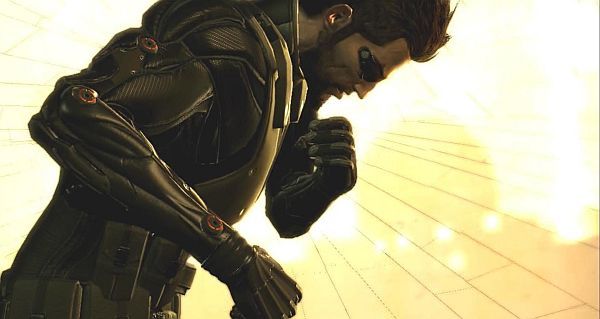 Additionally, some of the stealth-assistance augs that were optional in Human Revolution, like the ability to see a projection of your last known location or to have enemies appear on the mini-map without having to visually acquire them, are now given to you for free (a nice change from the usual sequel approach of de-powering the hero back to base levels, which Mankind Divided cleverly sidesteps). These are subtle choices, but taken as a whole they remove most of the guessing and hoping that made Human Revolution’s stealth occasionally frustrating.Even better, when things do escalate gunplay feels precise, and resetting the situation after setting off an alarm is much more manageable. Where in Human Revolution being seen would almost invariably plunge encounters into total chaos, Mankind Divided allows a well equipped and prepared player to feel powerful even when bullets begin to fly. The new Crysis-style on-the-fly weapon modification plays a big role here, adding a ton of utility and flexibility to standard firearms.
Additionally, some of the stealth-assistance augs that were optional in Human Revolution, like the ability to see a projection of your last known location or to have enemies appear on the mini-map without having to visually acquire them, are now given to you for free (a nice change from the usual sequel approach of de-powering the hero back to base levels, which Mankind Divided cleverly sidesteps). These are subtle choices, but taken as a whole they remove most of the guessing and hoping that made Human Revolution’s stealth occasionally frustrating.Even better, when things do escalate gunplay feels precise, and resetting the situation after setting off an alarm is much more manageable. Where in Human Revolution being seen would almost invariably plunge encounters into total chaos, Mankind Divided allows a well equipped and prepared player to feel powerful even when bullets begin to fly. The new Crysis-style on-the-fly weapon modification plays a big role here, adding a ton of utility and flexibility to standard firearms.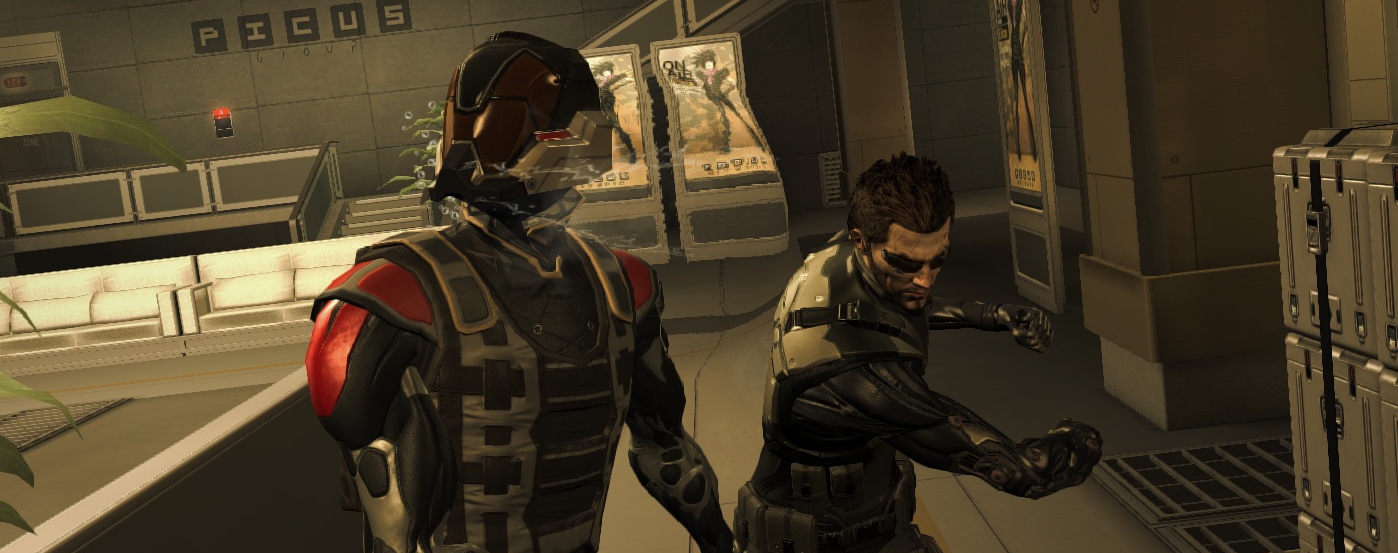 By quickly attaching a silencer, swapping the holo-scope for a 4X optical, and switching between full-auto to semi-auto firing modes, my mid-range spray-and-pray combat rifle could become a silent, serviceable sniper rifle in seconds. Finally, shooting no longer feels like something I’m not supposed to do in a Deus Ex game.
By quickly attaching a silencer, swapping the holo-scope for a 4X optical, and switching between full-auto to semi-auto firing modes, my mid-range spray-and-pray combat rifle could become a silent, serviceable sniper rifle in seconds. Finally, shooting no longer feels like something I’m not supposed to do in a Deus Ex game.
Finally, shooting no longer feels like something I’m not supposed to do.
“
The only real criticism I can level at Mankind Divided is that, especially in the wake of the events that close Human Revolution, its plot is decidedly less ambitious. It’s still well produced (barring slightly suspect lip-syncing) with dutiful, believable performances by the entire voice cast, but the story feels like it’s stuck in second gear. Rather than a steady ramping up of ever bigger and more ominous threats, the 20- to 30-hour campaign remains tightly focused on discovering the truth behind a bombing that occurs right off the bat. Over the course of the investigation it becomes clear there are larger forces at play, but unlike Human Revolution or the original Deus Ex, Mankind Divided never really follows that breadcrumb trail to the darkest corners of the cyberpunk world. It ends up feeling more like a first episode of a potentially great TV show rather than a complete feature-length film in that sense.
It ends up feeling more like a first episode of a potentially great TV show rather than a complete feature-length film in that sense.
Once More Unto The Breach
Completely independent of the story campaign, Breach is a nifty little extra mode you can hit for a quick, short fix of Deus Ex-ish style gameplay in a VR-themed world. As time-trial modes go, Breach has a lot going for it: a striking visual style, unique augs and abilities exclusive to the mode, and leaderboards to compete on for record times. It’s by no means revelatory, but it’s a welcome addition and a nice way to get that cybernetic badass rush in short, quick bursts while leveraging the same excellent mechanics that make the core game great.
Aside from the smaller-feeling plot, Deus Ex: Mankind Divided improves upon its excellent predecessor in every other way. Its impeccably designed environments are flush with possibility, remaining completely coherent while supporting a wide variety of routes and character builds, and Jensen’s prodigious new feats of techno-wizardry add new dimension to both combat and exploration.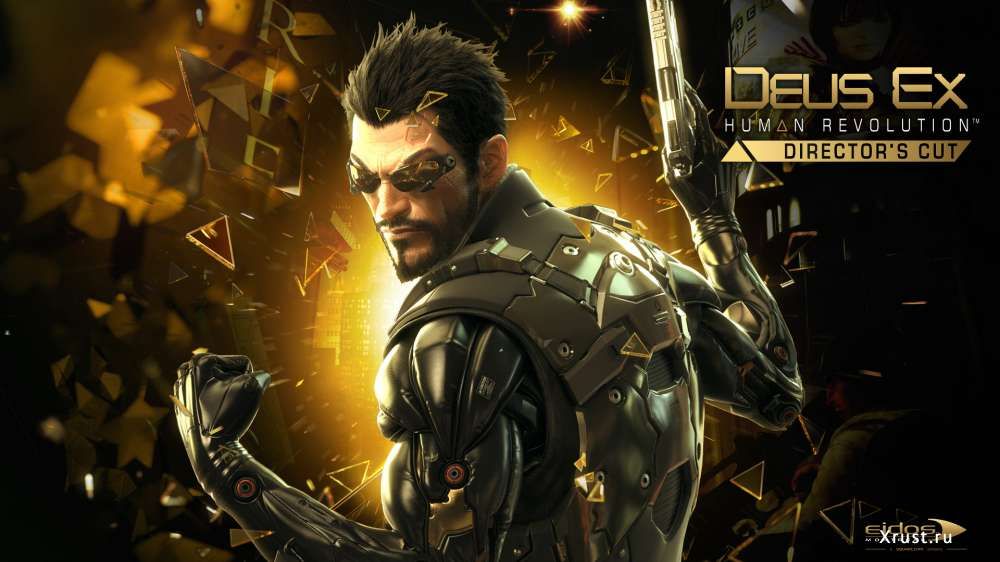 Mankind Divided never stopped challenging me or rewarding my curiosity, which pushed me to thoroughly explore its beautiful, ruined world while carefully weighing my decisions along the way.
Mankind Divided never stopped challenging me or rewarding my curiosity, which pushed me to thoroughly explore its beautiful, ruined world while carefully weighing my decisions along the way.
Deus Ex: Mankind Divided review
We use cookies and other tracking technologies to improve your browsing experience on our site, show personalized content and targeted ads, analyze site traffic, and understand where our audiences come from. To learn more or opt-out, read our Cookie Policy. Please also read our Privacy Notice and Terms of Use, which became effective December 20, 2019.
By choosing I Accept, you consent to our use of cookies and other tracking technologies.
By Arthur Gies
on August 19, 2016
at 9:00am
| Game Info |
|
Platform Win, PS4, Xbox One |
|
Publisher Square Enix |
|
Developer Eidos Montreal |
|
Release Date Aug 23, 2016 |
Deus Ex: Mankind Divided developer Eidos Montreal was a team founded almost exclusively to breathe life into Deus Ex.
The series lay more or less defunct after the disappointing reception of 2003’s Deus Ex: Invisible War and the sort-of spinoff Project: Snowblind. To revive it, Eidos Montreal rolled back the clock. Deus Ex: Human Revolution was a prequel that took Invisible War‘s console-friendly ideas and approachability and refined them, and the game tied it all together with a stunning neo-Renaissance aesthetic applied to a cybernetic future.
If you’ll allow me the cliche, Human Revolution wasn’t a perfect game, but it was brave, taking what worked in the series and simplifying along the way to tell an interesting story with breathtaking style and finesse. Now, five years later, Eidos Montreal has resurrected Adam Jensen in a world dealing with the aftermath of Human Revolution‘s augmented disaster. And, once again, Eidos Montreal seems determined to address the challenges that its predecessor faced.
In many ways, the studio has succeeded.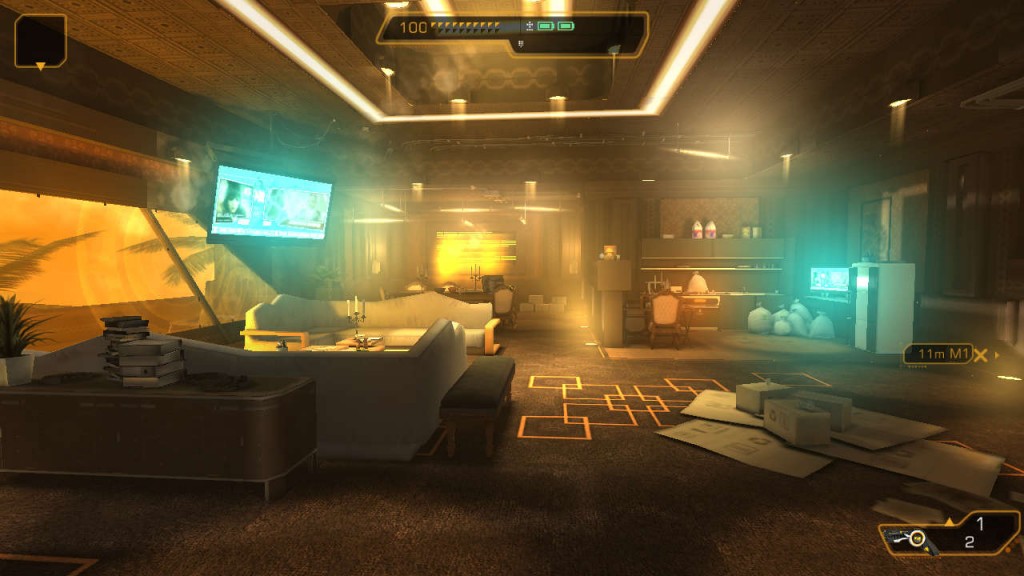 Deus Ex: Mankind Divided shines as an exercise in discovery, in presenting players with increasingly complicated problems and a huge amount of ways to solve them. And its fiction holds it up, even as the ambition it suggests never quite manifests.
Deus Ex: Mankind Divided shines as an exercise in discovery, in presenting players with increasingly complicated problems and a huge amount of ways to solve them. And its fiction holds it up, even as the ambition it suggests never quite manifests.
Mankind Divided opens two years after The Incident — where a sudden uncontrolled psychosis in every cybernetically augmented human on the planet was triggered deliberately, causing them to violently lash out at anyone around them. There was bloodshed and unrest all over the planet, and once the dust cleared, the augmented who remained were looked at with distrust by the world around them. In the middle of it all is Adam Jensen, a former Detroit cop turned augmented government agent.
Deus Ex: Mankind Divided is a (fill in the blank)-action-RPG hybrid, where it’s largely up to you as a player to fill in that blank. As you complete various missions, both critical-path tasks and involved side tasks, you’ll earn experience points that allow you to evolve and upgrade Jensen’s abilities.
If you played Deus Ex: Human Revolution, you may be raising your hand frustratedly, demanding to know how much more evolved (revolved?) Jensen could possibly be after two additional years of experience and refinement in his abilities, and the answer is, you get Metroid’ed — that is to say, Eidos Montreal contrives a series of events to, well, let’s say «factory-reset» Jensen’s firmware. Ordinarily this is a frustrating moment for me in action-adventure games that item-gate their areas, but Mankind Divided does a pretty good job of building a compelling fictional context for it.
This reboot forces you to slowly rebuild and prioritize Jensen’s abilities and tailor them around exactly how you want to play the game. There are typically three means of progressing through each area: combat, stealth or hacking. Occasionally you’ll also be able to avert conflict via dialogue. There are abilities to support all of these things — you can make Jensen a nearly indestructible, mirror-shaded robocop; a Gibsonian cybernetic hacker; or a mechanical Sam Fisher, à la Splinter Cell.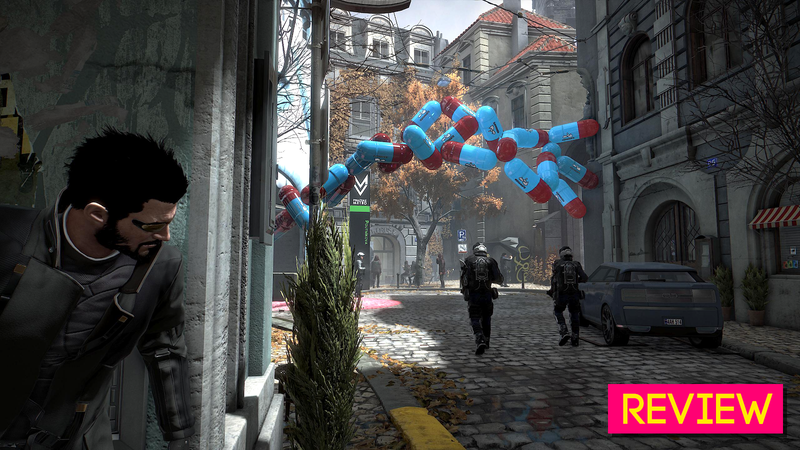
There are options to improve reflexes, fall from great heights, jump higher, lift almost any object that isn’t nailed down and then some. The Praxis system isn’t as granular as more stats-driven games, but it’s enough to specialize without screwing yourself into an overly specific build if you’re smart.
That last part is important, because more so than Human Revolution before it, Mankind Divided isn’t prepared to let you focus only on one kind of play style. Each ability is a solution to a specific problem, and each mission is a collection of problems to solve.
Sneaky players who like to circumvent conflict by crawling through ductwork and access tunnels will probably need to upgrade their strength augmentations to move heavy machinery that blocks that kind of access, or to punch through walls in maintenance areas to keep off the grid. Hackers might still want to invest in Adam’s cloaking ability to stay hidden as they access exposed computers and keypads.
In this way, Mankind Divided is evocative of the exploration-oriented action-adventure games that use Nintendo’s Metroid series as a foundation — many areas of the game are inaccessible until you possess the appropriate tools to reach them. But Mankind Divided doesn’t make you find them. Instead, you can pick your tools, but it will be late in the game before you can possibly do everything.
That choice in how you proceed and succeed — and, in turn, how you screw yourself — becomes a big part of Mankind Divided’s uniquely rewarding progression system. Mankind Divided doles out experience for almost every task, from knocking out a guard nonlethally to finding another vent.
I’m sure that for some people, Mankind Divided will provide a cybernetic ass-kicking simulator, where they can be the black-alloy’d superhero killing machine of their dreams. Mankind Divided gives you all the tools to make that happen, and its combat fundamentals are pretty strong, a far cry from the rough basics in Human Revolution.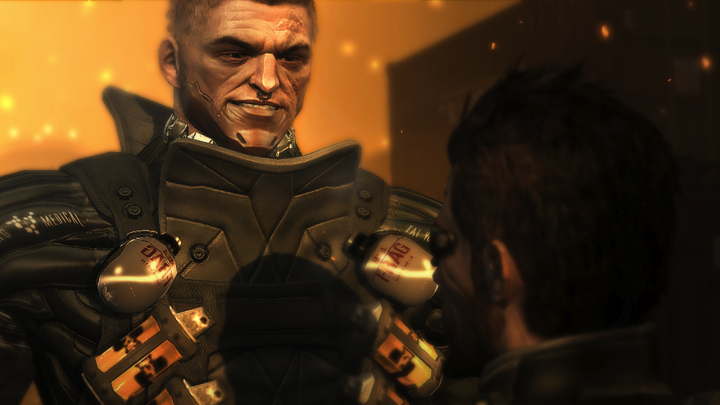 There are even major augment trees dedicated to additional combat options. If you want to play that way — you know, as a monster — you can.
There are even major augment trees dedicated to additional combat options. If you want to play that way — you know, as a monster — you can.
But Mankind Divided provides a host of violence-avoidance or, at least, nonfatal options. It isn’t just possible to play through the game without killing anyone; it often seems like the game encourages it. As I got more experience, I gained new ways to explore the world and progress without leaving a trail of blood behind me.
Rewarding exploration and learning is the best kind of positive reinforcement for discovery in a game like this, and it scratched at some of my most compulsive habits by dangling information just out of reach practically all the time.
Mankind Divided’s fiction is one of its biggest strengths. It’s a thoroughly realized world with some very high-concept narrative conceits — the augmented future, the disasters that result — but it also frequently gets into the everyday details of the lives of the people that live in that world.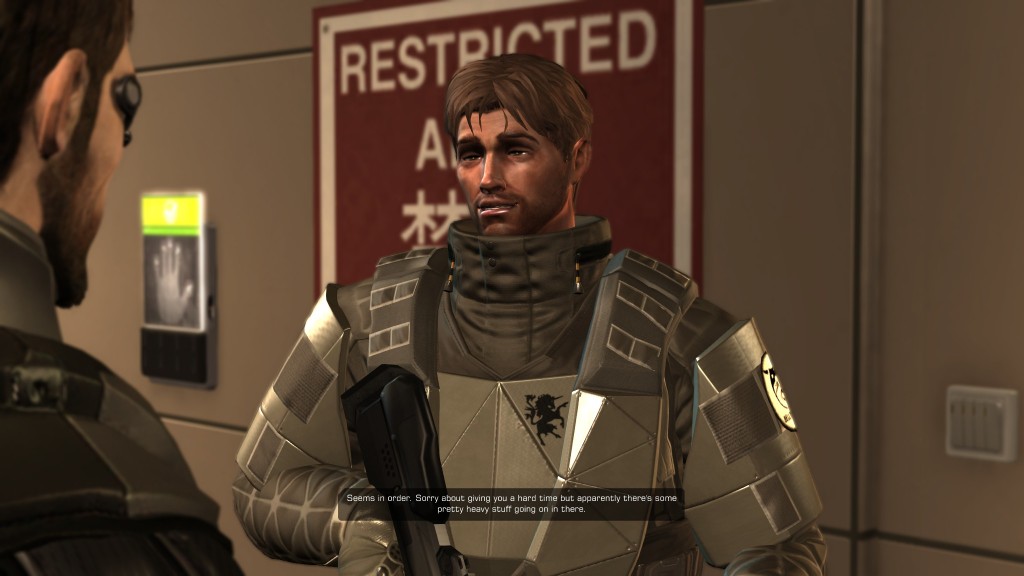 There’s information about the world everywhere, behind locked doors — whether mission-critical, just helpful or just interesting flavor text — and I wanted to see all of it. Every locked door in Mankind Divided was a dare to open it, to explore inside.
There’s information about the world everywhere, behind locked doors — whether mission-critical, just helpful or just interesting flavor text — and I wanted to see all of it. Every locked door in Mankind Divided was a dare to open it, to explore inside.
This is bolstered by Mankind Divided’s moment-to-moment writing. This is most evident in some truly great side missions found throughout Prague. Some of them feel much more fleshed out and fully realized than the narrative critical path, including an expedition into the most powerful bank in the country to find the secrets of the «fair and balanced» Picus media group.
While a few missions take place in other spots, most of Mankind Divided unfolds across Prague’s various neighborhoods. And in a fairly large change for this kind of game, each neighborhood is seamless — you just walk into shops, or your base, or the Palisade Bank, or bars in the red-light district, without load times.
As I walked out of the aforementioned heist at the Palisade Bank, I emerged onto the street without pause and went about my business. It’s not that Mankind Divided is an open-world game — it’s not that huge — but it’s a more involved action-RPG with lots of mechanical experimentation and an emphasis on exploration, and it felt almost revolutionary to move around those spaces without having to stop (unless you have to reload a save, in which case, hoo boy, you might be waiting a while).
It’s not that Mankind Divided is an open-world game — it’s not that huge — but it’s a more involved action-RPG with lots of mechanical experimentation and an emphasis on exploration, and it felt almost revolutionary to move around those spaces without having to stop (unless you have to reload a save, in which case, hoo boy, you might be waiting a while).
This has the effect of making side missions feel as important, if not more so at any given point, as the central storyline of Mankind Divided. Wisely, despite some insistent voice cues suggesting otherwise, the game will wait for you to do what you want to do. I’d estimate about 20 of my 30 or so hours in the game were spent doing side content.
That said, there were several choices Mankind Divided had me make that forced me to put the controller down and really think about them. Jensen often has to balance his needs to unravel the conspiracies he’s mired in with the basic human cost of inaction elsewhere, and Eidos Montreal seems largely unconcerned with my desire to feel like a good person who can fix all the things.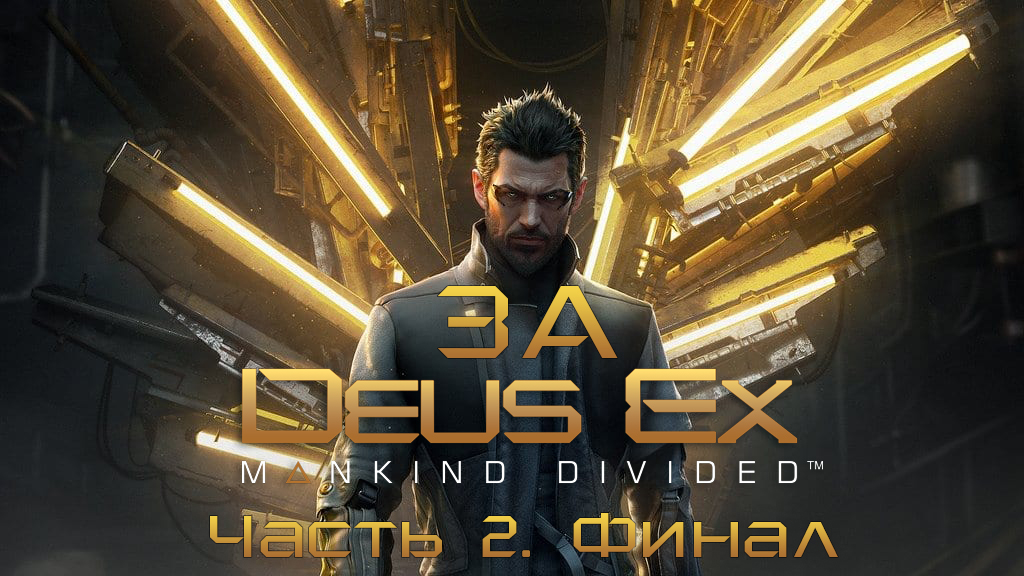 Sometimes, compromises can be found and everything can be fixed, but that’s rarely the case.
Sometimes, compromises can be found and everything can be fixed, but that’s rarely the case.
Consequences elsewhere feel organic in a way that defies more clearly defined win-or-lose conditions. Nonlethal doesn’t equal nonviolent, for example, and I was surprised to be confronted after one mission for my nonlethal takedown-heavy run that state police labeled «an augmented terrorist attack.» I also didn’t expect to have my behavior in task force HQ pointed out to me by a nervous analyst in a conversation; more than in any game I can remember, I felt, well, caught in the act.
Coincidentally, I reloaded that mission and found a way to finish it in just a few minutes, without ever coming in contact with any police, all via cunning use of cardboard boxes dragged through a ventilation duct.
If Mankind Divided has any major problems, it’s a difficulty in cashing the checks that its setting and narrative write.
There’s every indication that Mankind Divided will explore a global conspiracy, that it will seek to unravel both the mysterious Illuminati’s plans for the Augmented, and what happened to Jensen in the two years after the events of Human Revolution.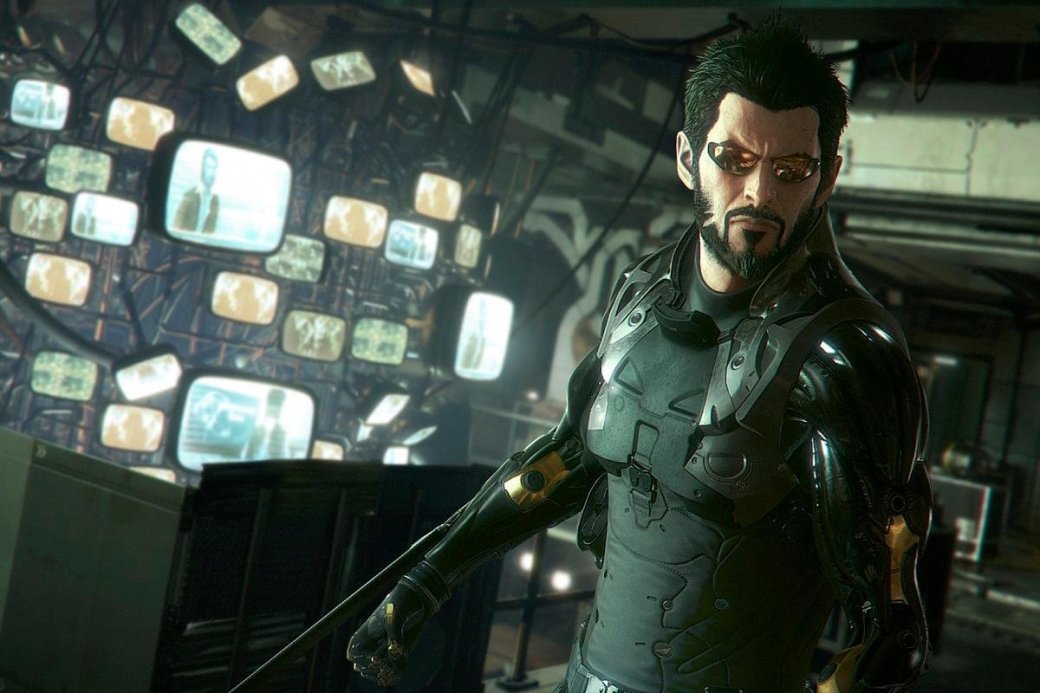 Instead, Eidos Montreal is largely content to play in Prague, with minor detours to very limited spaces elsewhere that compose a small fraction of the game.
Instead, Eidos Montreal is largely content to play in Prague, with minor detours to very limited spaces elsewhere that compose a small fraction of the game.
It’s strange, having played Human Revolution and now Mankind Divided, and being struck with a sense that the former was somehow more grandiose than the latter. The levels in Human Revolution were almost certainly smaller, allowed for somewhat less experimentation and were more segmented. But the game went places, both story-wise and geographically, and Mankind Divided feels like a yo-yo on a considerably shorter string.
But the most frustrating thing about Mankind Divided is how abruptly it’s all over.
I try not to exaggerate in reviews, so believe me when I describe my reaction to Mankind Divided’s conclusion as «stunned.» There’s a host of story threads presented that are explored over the game’s 30 hours and dropped without comment or resolution after a fairly anticlimactic boss battle.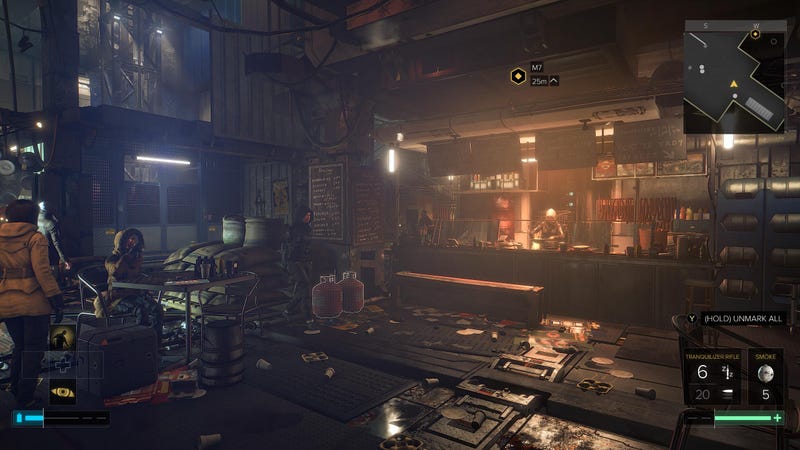 Very little of the conspiracy Jensen is investigating is revealed, and by the end, there are few answers and a pile of new questions. There’s only a faint whiff of resolution, and the prospect of waiting another five years to see how Eidos Montreal’s mechanical augmentations ultimately give way to the nanotech dystopia of the original Deus Ex left me feeling pretty deflated.
Very little of the conspiracy Jensen is investigating is revealed, and by the end, there are few answers and a pile of new questions. There’s only a faint whiff of resolution, and the prospect of waiting another five years to see how Eidos Montreal’s mechanical augmentations ultimately give way to the nanotech dystopia of the original Deus Ex left me feeling pretty deflated.
Wrap Up:
Mankind Divided’s cybernetic playground feels fresh, even if it doesn’t go as far as expected
I’m left hoping that Deus Ex: Mankind Divided’s developers have an aggressive post-launch plan to continue the game’s story beyond its surprising endpoint. It’s a mottled cherry dropped on top of a game that otherwise makes for subtly major evolutions of action-RPG spaces, and for a world as interesting as Deus Ex’s, it would be a crime to leave it where it stands for another five years.
Deus Ex: Mankind Divided was reviewed in part using a non-final «debug» PS4 copy and was played to completion using a retail Xbox One download code provided by Square Enix.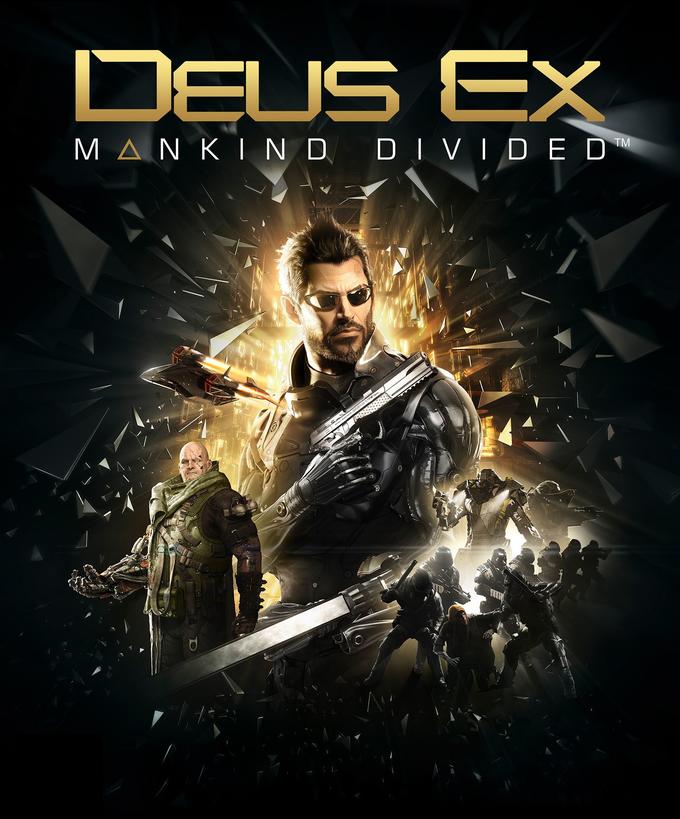 Polygon has not had the opportunity to evaluate the game’s day-one patch, and because of stability issues and a lack of opportunity to evaluate online aspects of the game, this review will remain provisional until we’re able to determine the launch state of the game. You can find additional information about Polygon’s ethics policy here.
Polygon has not had the opportunity to evaluate the game’s day-one patch, and because of stability issues and a lack of opportunity to evaluate online aspects of the game, this review will remain provisional until we’re able to determine the launch state of the game. You can find additional information about Polygon’s ethics policy here.
About Polygon’s Reviews
8.5 Win
8.5 PS4
8.5 Xbox One
Latest Reviews
Deus Ex. Nostalgic review — Games on DTF
Deus Ex are a happy occasion. A game from a company that (let’s face it) wasn’t very good. Ion Storm were ambitious and inventive, and some of their games sold for those reasons alone. But then there is Deus Ex, a game that has no equal.
3130
views
Video version:
A game with a thousand mini-games and gameplay elements, some of which work together in harmony against the odds. It feels like there are forces at work behind the scenes that you can’t control.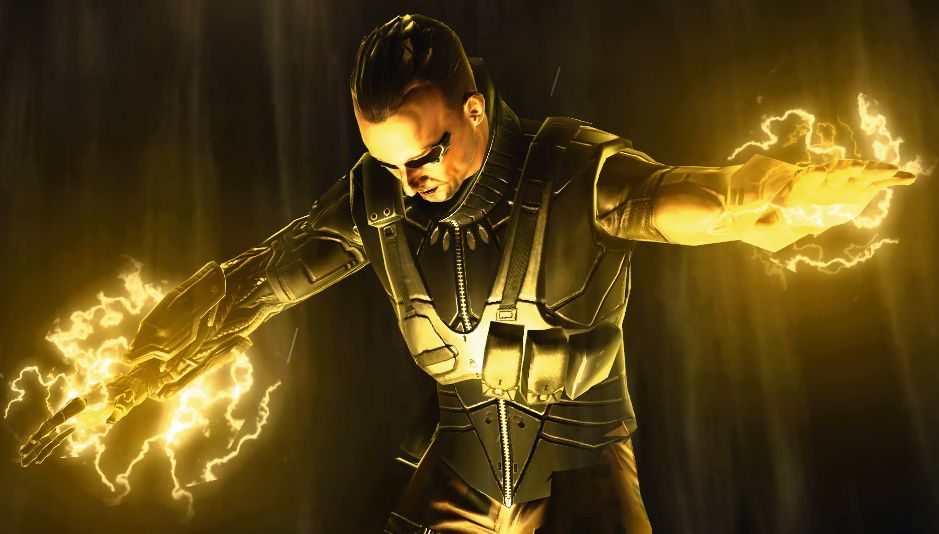 It’s like the world is alive and the developers are always thinking one step ahead, teasing you with difficult decisions. Sometimes you don’t even know what you need to do. Yes, Ion Storm made YOU feel stupid. It’s hard to explain, but it’s like they created a game in an alternate reality where things are a bit different. Deus Ex makes you feel like you’ve made a mistake. The tutorial becomes its own level, quickly guiding you through the core game mechanics. I’ll be damned if I can remember all this when I play it again! And I think that’s the beauty of Deus Ex. You’re a bumbling disaster, jumping between playstyles, clinging to everything you know how to use, trying to solve puzzles using only half of what you need but end up solving it with things you shouldn’t have used. And this, I think, is the beauty of Deus Ex. Your character is surrounded by the unknown. You learn to dread every step, knowing that the developers can throw a huge robotic killing machine around any corner. Goals seem impossible until they are achieved, and then you may look back at them and wonder how you ever found them difficult.
It’s like the world is alive and the developers are always thinking one step ahead, teasing you with difficult decisions. Sometimes you don’t even know what you need to do. Yes, Ion Storm made YOU feel stupid. It’s hard to explain, but it’s like they created a game in an alternate reality where things are a bit different. Deus Ex makes you feel like you’ve made a mistake. The tutorial becomes its own level, quickly guiding you through the core game mechanics. I’ll be damned if I can remember all this when I play it again! And I think that’s the beauty of Deus Ex. You’re a bumbling disaster, jumping between playstyles, clinging to everything you know how to use, trying to solve puzzles using only half of what you need but end up solving it with things you shouldn’t have used. And this, I think, is the beauty of Deus Ex. Your character is surrounded by the unknown. You learn to dread every step, knowing that the developers can throw a huge robotic killing machine around any corner. Goals seem impossible until they are achieved, and then you may look back at them and wonder how you ever found them difficult.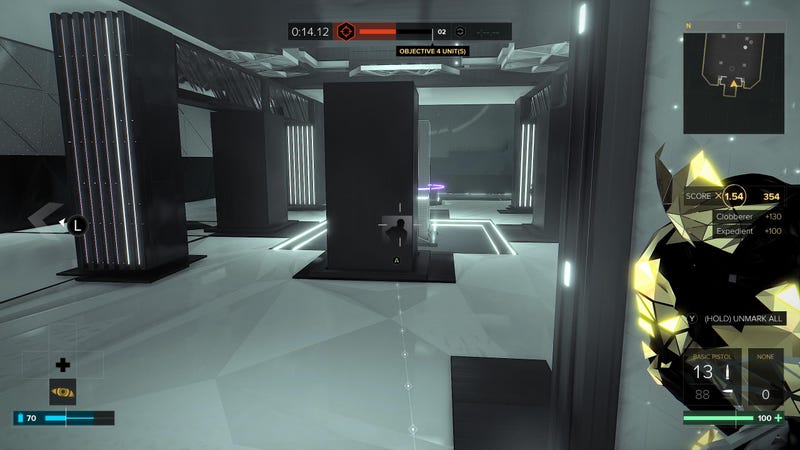 The mess of being thrown into places I didn’t understand made the world feel alive, not a game that feeds the player at every opportunity. nine0003
The mess of being thrown into places I didn’t understand made the world feel alive, not a game that feeds the player at every opportunity. nine0003
The strangest thing about Deus Ex is that there is nothing particularly good about it. Shooting is terrible. Stealth is average, AI is mentally retarded. And blind. And deaf. The game has more in common with Minecraft or Postal, where exactly how YOU feel about the elements of the gameplay determines your experience. It’s about being caught in a building, only to jump out of a window, losing both legs in the process, but manage to crawl to safety. It’s about alerting the guard, who then runs to the panic button next to which you previously placed C4. It’s about being in control, even if it means running over a cleaner who just happened to be in the wrong place at the wrong time. You can jump off the skyscraper onto the people below. You can upgrade your mindless swimming abilities to go down the sewer hole. You can hit the meat in the shop with your sword BECAUSE YOU CAN! nine0003
People will criticize the game because it looks bad.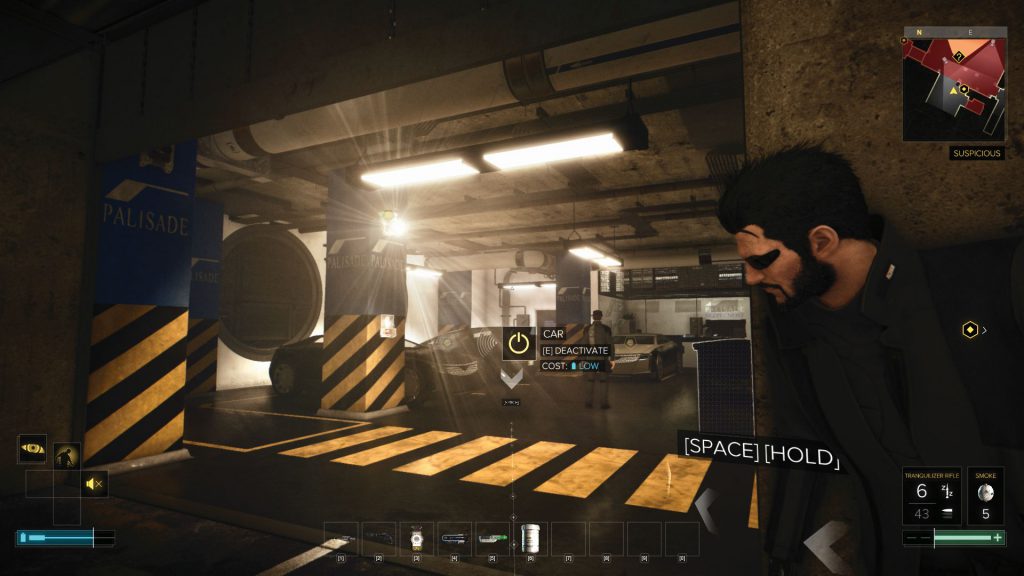 Personally, I think it looks ok, and the simple graphics allow for large worlds, which works in this game’s favour. The game doesn’t make obvious signs when you’re doing something right. Maybe it’s because everything is in shades of gray. It seems that you broke the game and can freely roam the glitch world, only to later be spit in your face with the words: «HAHA, I knew that she would do it!». It’s hard to explain, as if I was being watched by an approaching dark entity that seemed to be able to predict my every move. In other games, once you master the gameplay mechanics, you will be able to see through illusions and reveal the inner workings. For me, Deus Ex is still an undiscovered focus. The game environment is extensive. Although at that time there was nothing to compare with. nine0003
Personally, I think it looks ok, and the simple graphics allow for large worlds, which works in this game’s favour. The game doesn’t make obvious signs when you’re doing something right. Maybe it’s because everything is in shades of gray. It seems that you broke the game and can freely roam the glitch world, only to later be spit in your face with the words: «HAHA, I knew that she would do it!». It’s hard to explain, as if I was being watched by an approaching dark entity that seemed to be able to predict my every move. In other games, once you master the gameplay mechanics, you will be able to see through illusions and reveal the inner workings. For me, Deus Ex is still an undiscovered focus. The game environment is extensive. Although at that time there was nothing to compare with. nine0003
This is an amazing game that I spent half a semester at school researching. I’m just exploring! In the world of Unreal Tournament, Half Life and other scenarios or simple shooters, Deus Ex was a breath of fresh air.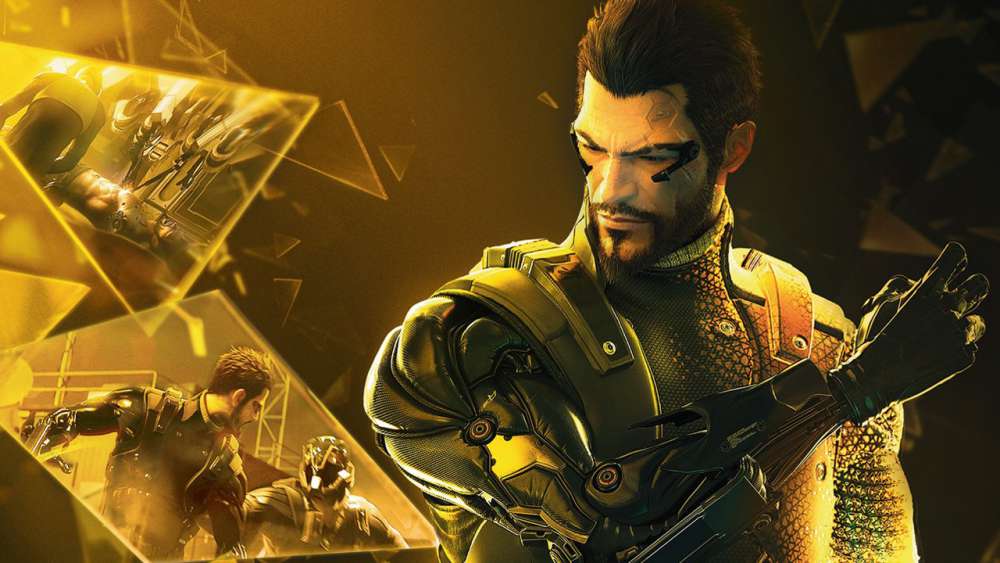 Find little stories between characters or discover apartments that no one has found before. Other games try to get you to explore every nook and cranny by giving you quests. Deus Ex just lets you explore it. You may find yourself on a mission without even knowing it, by mistakenly destroying a secret base in the sewers! It’s their problem that they’re down there. At that time I was young. A friend told me I should play it, but I was always intimidated by how DIFFICULT and relentless it was. And yet something about this dark, futuristic world continued to beckon me. This game simply had more than anything else available at the time. I was caught in a seething tide of rival factions. Hidden organizations behind two-way mirrors in nightclubs. High-tech laboratories keeping terrible secrets. Every time I played the game I would get a little further and then get stuck. I didn’t know where to go. This was in the era before I had the INTERNET! I stopped playing for a couple of months, then played again and moved on.
Find little stories between characters or discover apartments that no one has found before. Other games try to get you to explore every nook and cranny by giving you quests. Deus Ex just lets you explore it. You may find yourself on a mission without even knowing it, by mistakenly destroying a secret base in the sewers! It’s their problem that they’re down there. At that time I was young. A friend told me I should play it, but I was always intimidated by how DIFFICULT and relentless it was. And yet something about this dark, futuristic world continued to beckon me. This game simply had more than anything else available at the time. I was caught in a seething tide of rival factions. Hidden organizations behind two-way mirrors in nightclubs. High-tech laboratories keeping terrible secrets. Every time I played the game I would get a little further and then get stuck. I didn’t know where to go. This was in the era before I had the INTERNET! I stopped playing for a couple of months, then played again and moved on. I thought I could handle the entry levels, but no — there were always new places to explore and new stories to get lost in. I laughed as I explored the woman’s bathroom, then felt ashamed when my boss brought the matter up again later. It’s like my track record is forever tarnished, and these NPCs I’ve shared my adventures with might hold a grudge. They are still more human and real than the high poly models in later games. nine0003
I thought I could handle the entry levels, but no — there were always new places to explore and new stories to get lost in. I laughed as I explored the woman’s bathroom, then felt ashamed when my boss brought the matter up again later. It’s like my track record is forever tarnished, and these NPCs I’ve shared my adventures with might hold a grudge. They are still more human and real than the high poly models in later games. nine0003
I couldn’t believe this game existed. It was its own league, and to this day it holds a special place in the world of video games. And I’m not just talking about the women’s toilet)). At one point, you take the woman back to her castle in France and she walks around the place, telling you stories from her childhood. It was such a profound moment for me as I followed her, almost forgetting for a second that this was all a fictional world. My interaction with NPCs prior to this game has always been to shoot them in the face or treat them as an object to further progress through the game.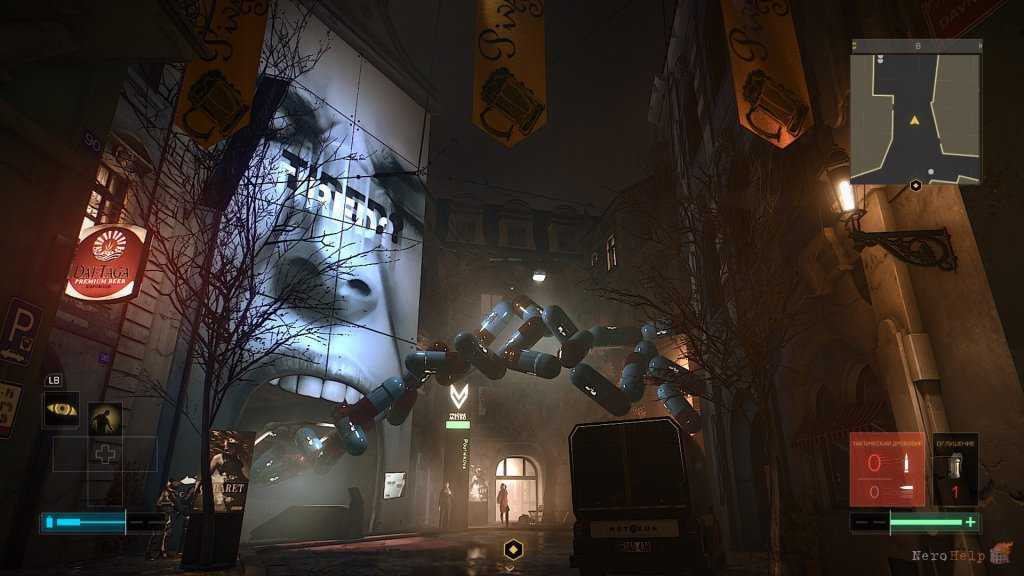 And yet here I am, listening to an imaginary character talking about a fictional experience in a place that doesn’t exist! nine0003
And yet here I am, listening to an imaginary character talking about a fictional experience in a place that doesn’t exist! nine0003
Deus Ex has a powerful soundtrack. It has an incredible theme song and plenty of catchy backing tracks that most modern games lack. We have to thank Alexander Brandon and Michel Van Den Bos for this, the guys who also worked on Unreal Tournament. Michel wrote the UNATCO song, «Lebedev Airfield» and the song in the castle I mentioned earlier, as well as some of the most memorable songs for Unreal Tournament, including Forgone Destruction, the song for Facing Worlds. nine0003
But the games have moved on and have probably surpassed Deus Ex in many ways. The fact is that no game has managed to surpass it in all areas. I can imagine that it’s harder for new players to get along with her, but I highly recommend that you give it a try. It hasn’t been outdated in the same way as other games because there are few games to directly compare it to! This is a strange and unique combination of game elements that make it incomparable to anything else. It’s like what Bollywood is to Hollywood — it imitates and borrows certain elements, but adds a different culture and style to the mix, becoming something new in the process. Imagine what people in the 18th century would do if they could create a computer game, and how alien it would be. To me, Deus Ex is as strange and unique as one of these hypothetical examples. The game has left its mark on me. The fact that they didn’t get the same sense of freedom with the release of the next Deus Ex shows that the developers probably didn’t know what made it so good either. It’s a secret! Everyone loves a good riddle. nine0003
It’s like what Bollywood is to Hollywood — it imitates and borrows certain elements, but adds a different culture and style to the mix, becoming something new in the process. Imagine what people in the 18th century would do if they could create a computer game, and how alien it would be. To me, Deus Ex is as strange and unique as one of these hypothetical examples. The game has left its mark on me. The fact that they didn’t get the same sense of freedom with the release of the next Deus Ex shows that the developers probably didn’t know what made it so good either. It’s a secret! Everyone loves a good riddle. nine0003
The opposite of Deus Ex will be Call of Duty — it’s simplified and polished, appealing to the lowest common denominator. Deus Ex, on the other hand, is deep and complex, but it lacks balance and polish. Imagine if it could be polished and refined in the same way as Call of Duty, how monumental the end result would be. But until then, Deus Ex stands alone. It is a mature and profound title designed to break stereotypes and confuse us ordinary people with decisions and choices, and then punish and reward us with their consequences.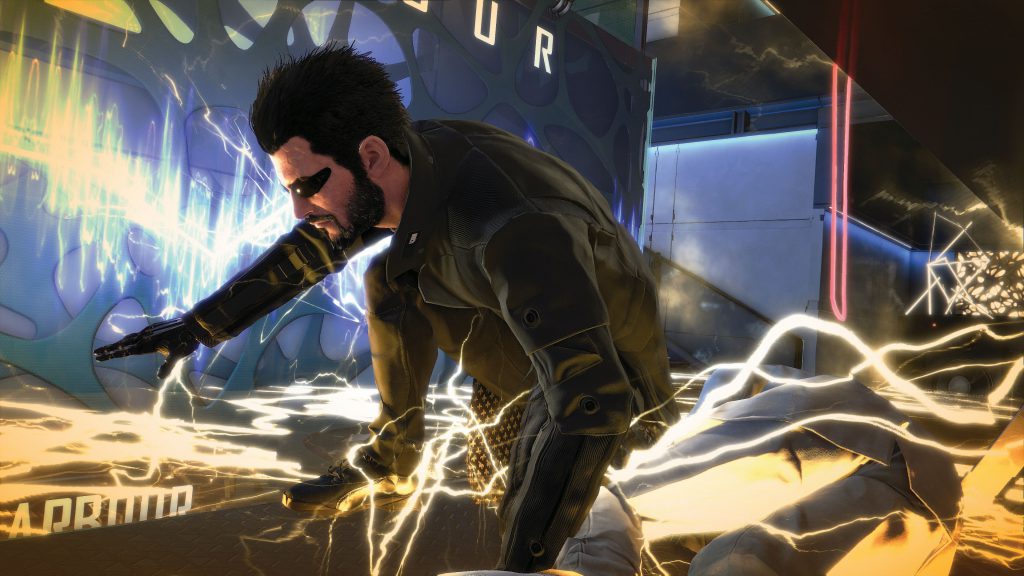 It’s a living, breathing story that walks the fine line between freedom and storytelling that few have tried to replicate since. It was a game far ahead of its time. In fact, I think it still is. Who would waste 20 hours of gameplay to reload an earlier file to try and save their fictional brother? Who could kill a supposedly innocent worker just to get paid for it? Who could ask for this? Thank you, Ion Storm, for an unfortunate but brilliant masterpiece. The future has never looked so bleak and at the same time so attractive. nine0003
It’s a living, breathing story that walks the fine line between freedom and storytelling that few have tried to replicate since. It was a game far ahead of its time. In fact, I think it still is. Who would waste 20 hours of gameplay to reload an earlier file to try and save their fictional brother? Who could kill a supposedly innocent worker just to get paid for it? Who could ask for this? Thank you, Ion Storm, for an unfortunate but brilliant masterpiece. The future has never looked so bleak and at the same time so attractive. nine0003
Original:
Deus Ex: Mankind Divided: Overview of
Racism, xenophobia, tolerance — these topics are so relevant today that they easily push and set off the usual “beaver-donkey fight” even in fantastic and fantasy RPGs that seem to be very far from this. Vivid examples are the The Witcher series, and now here is Deus Ex: Mankind Divided , the long-awaited sequel to the main cyberpunk game of all time.
nine0002 The game has a competitive mode, which is a hacker simulator in virtual space.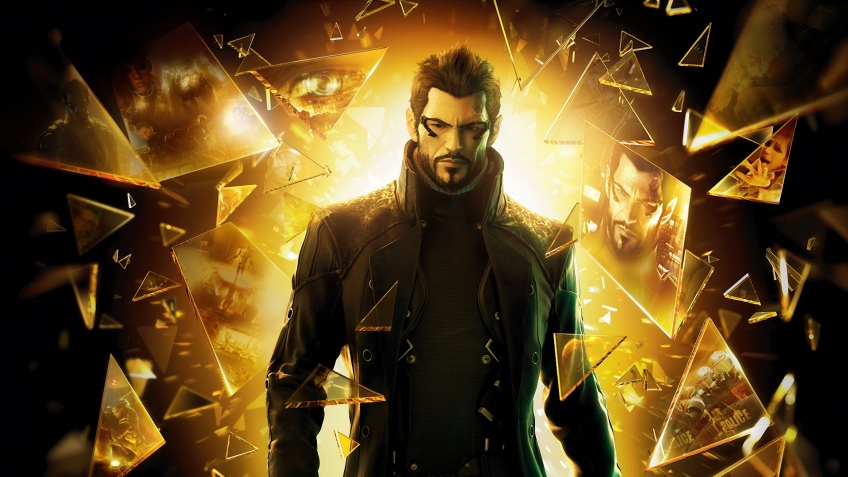
Cyberracism
In general, there is much in common between the witcher Geralt and agent Adam Jensen. It is for nothing that the latter lives in the future, and not in the past, but it is not a gray tail that distinguishes him, but black glasses and a goatee of the same color. Both are artificially created killing machines, superhumans with abilities inaccessible to ordinary mortals, while more than others, caring about goodness and justice. Or not caring — decide for yourself! nine0033
It is this artificiality and “feature” that causes Adam Jensen to be looked down upon after millions of cyborgs like him suddenly went crazy in 2027, losing control of themselves for a short time. Since then, they have been almost openly hated: they have been oppressed in every possible way, restricted and driven into the ghetto. In response, the CPA organization appeared, fighting for the rights of «augs» — that is, people equipped with implants.
Two years later, in Prague, where action 9 takes place0029 Mankind Divided , a terrorist attack occurs, which seems to be behind augs.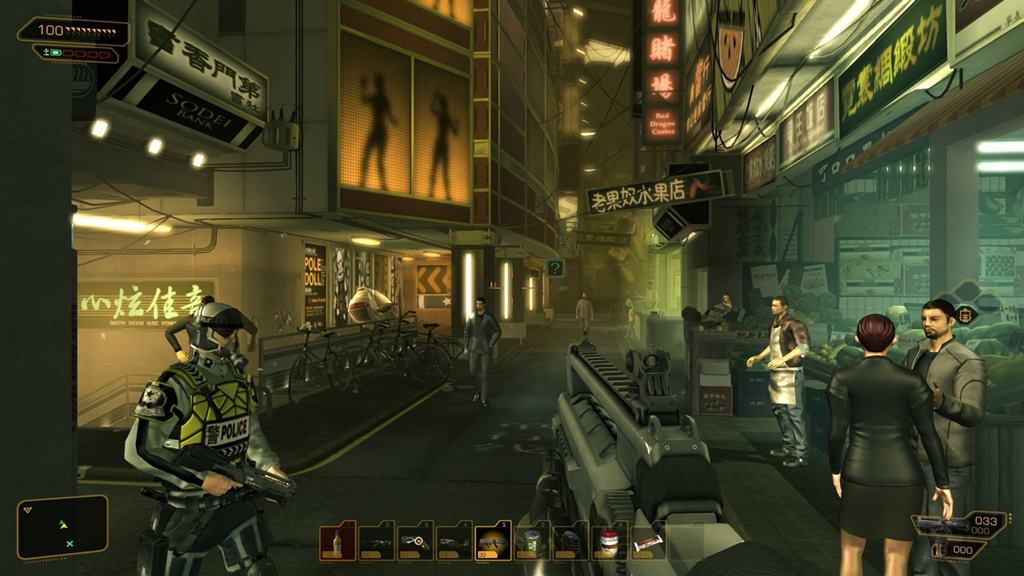 The irony is that it is Adam Jensen, who serves in Task Force 29 (this is such a local Interpol), who is instructed to contact the leader of the CPA and arrest him. And Adam is the only augmented agent in the office. To give you an idea of the situation in which he finds himself, imagine that during the recent riots in the United States, when blacks killed white police officers at rallies and vice versa, the local police department has the only African American cop assigned to investigate this case. nine0033
The irony is that it is Adam Jensen, who serves in Task Force 29 (this is such a local Interpol), who is instructed to contact the leader of the CPA and arrest him. And Adam is the only augmented agent in the office. To give you an idea of the situation in which he finds himself, imagine that during the recent riots in the United States, when blacks killed white police officers at rallies and vice versa, the local police department has the only African American cop assigned to investigate this case. nine0033
Friendly among strangers, stranger among friends
The writers of Deus Ex: Mankind Divided , like their colleagues from CD Projekt , very competently and correctly interfere with science fiction and abstract things (in this case, cyberpunk Illuminati, transhumanism and other conspiracy theories) with more than relevant topics close to everyone.
The red light district has been expertly implemented.
Almost immediately we find ourselves in an atmosphere of total discrimination, xenophobia and racism. Prague no longer resembles a typical cyberpunk metropolis, but the capital of a totalitarian police state, where cops at every turn demand documents from Augs, including Jensen, and send the unreliable to suburban slums, to the ghetto for such cyber scum. nine0033
Prague no longer resembles a typical cyberpunk metropolis, but the capital of a totalitarian police state, where cops at every turn demand documents from Augs, including Jensen, and send the unreliable to suburban slums, to the ghetto for such cyber scum. nine0033
At the same time, a powerful intrigue and a lot of questions arise. Why is the only cyborg in the team sent to hunt for the leader of an organization that protects the rights of just augs? Who benefits, who is to blame? And isn’t it all a set-up, pursuing far-reaching goals? Naturally, a set-up — and immediately Jensen, out of old habit, plunges into a whirlpool of new scandals, intrigues, investigations and conspiracy theories. In which, however, there will be a lot of references and explanations to the events of the past and future shown in different games of the series. nine0033
Jensen is there, Jensen is here!
However, the presentation of the plot and the overall structure of the game have not changed compared to Deus Ex: Human Revolution .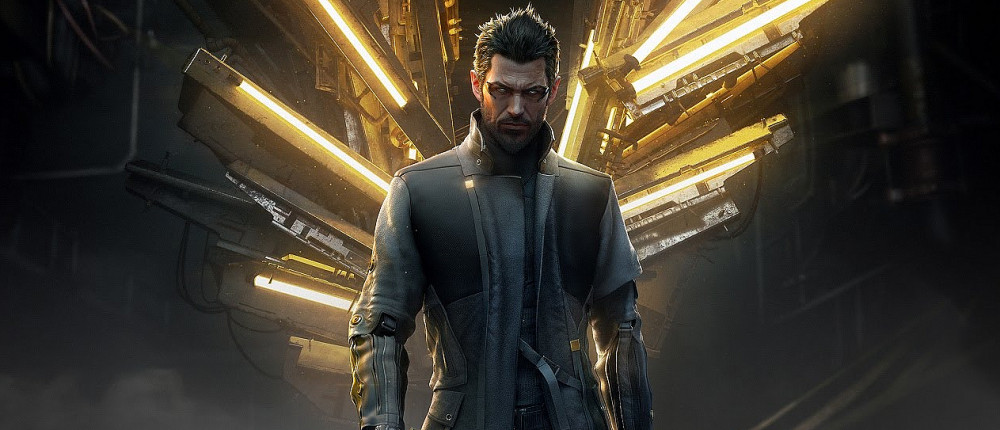 There is an open city that we are free to explore, completing various tasks or simply hacking other people’s computers in other people’s apartments. And there are obligatory story missions when we are parachuted to some place (besides Prague there will also be slums for Augs, Dubai, London) and are ordered in any way (secretly or in Rambo style) to complete a certain task, to get to some important person. At the end, an obligatory dialogue awaits, reminiscent of a meeting with a psychotherapist. nine0033
There is an open city that we are free to explore, completing various tasks or simply hacking other people’s computers in other people’s apartments. And there are obligatory story missions when we are parachuted to some place (besides Prague there will also be slums for Augs, Dubai, London) and are ordered in any way (secretly or in Rambo style) to complete a certain task, to get to some important person. At the end, an obligatory dialogue awaits, reminiscent of a meeting with a psychotherapist. nine0033
But at the same time, everything has become more — the city itself, tasks and dialogues. Prague is significantly larger than Detroit or Hensha from Human Revolution . The city pleases with absolutely chic cyberpunk design and architecture, the presence of real (well, almost) life on the streets, an abundance of all kinds of scenes with the participation of citizens and the police, a combination of fountains, bridges, various buildings, shops where you can go and bargain, bars and brothels.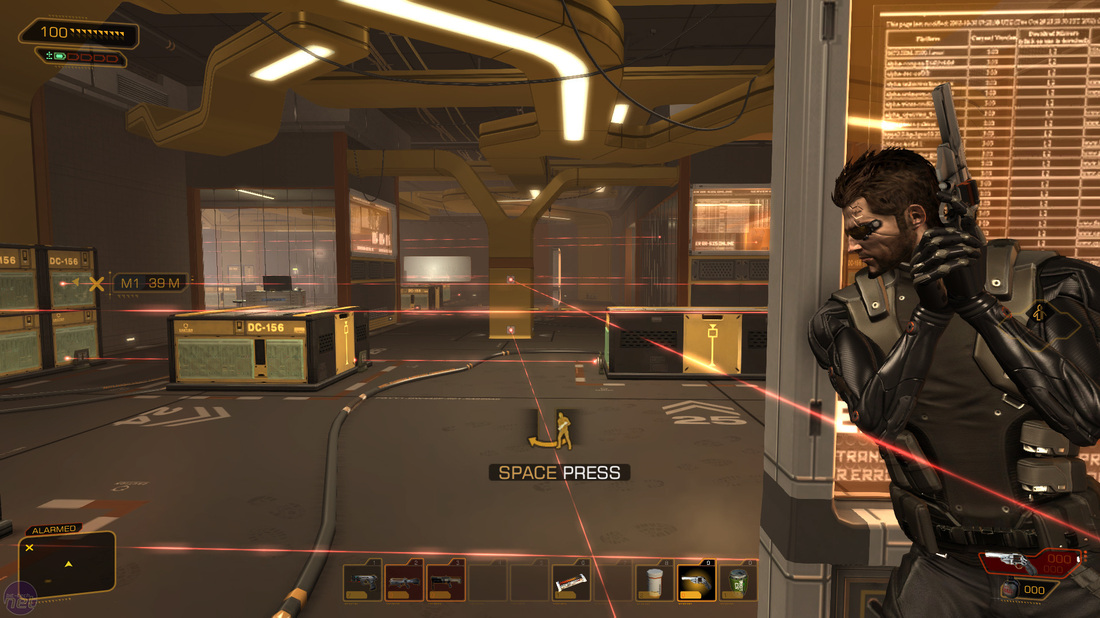 I even had to introduce a fast travel system through the metro — Prague is divided into several large quarters. nine0033
I even had to introduce a fast travel system through the metro — Prague is divided into several large quarters. nine0033
During dialogues, it is sometimes possible to quickly interrupt the interlocutor, for example by calming or blaming him.
And in this city, Adam has something to do besides his business and intrigues. As soon as he leaves his apartment at the very beginning of the game, he can climb into some sewers, run into strange cultists and investigate this muddy case, ignoring the cries of the chief from the office: “Adam, where are you? I’m waiting for you at work!
Then there will be work for local criminal authorities from the «Georgian mafia» or, for example, collecting compromising evidence for opposition journalists. And even during the execution of some plot task, you may be asked for an additional service — for example, save the detainee from the clutches of the police, find his pass card and use an additional password. nine0033
Adam speaks and chooses
The scriptwriters don’t bombard us with emphatic moral questions, as is now customary.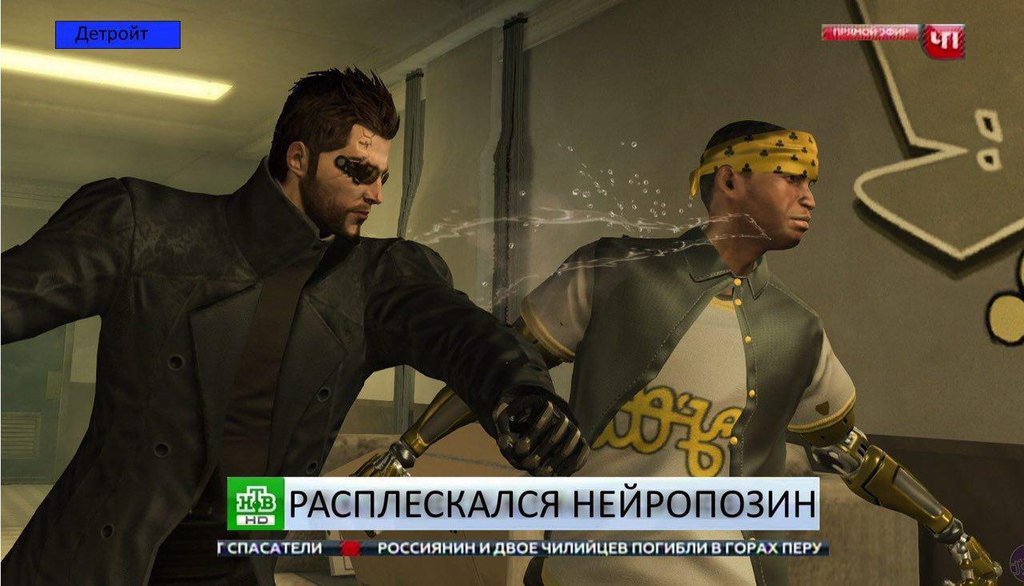 The main moral dilemmas are traditional for the series — act covertly or openly, kill or stun, break in the door, give a bribe and threaten or trick and go around through the ventilation (well, of course, through the ventilation).
The main moral dilemmas are traditional for the series — act covertly or openly, kill or stun, break in the door, give a bribe and threaten or trick and go around through the ventilation (well, of course, through the ventilation).
But from time to time there are really difficult situations that require exactly our decision — when, for example, you need to choose which of the two augmented «comrades in misfortune» to activate fake documents. Those who are unlucky are likely to be arrested or exiled to the ghetto. Some important forks (to whom, for example, to give important evidence) will directly affect the conditions in which Jensen will continue to act, and although the plot remains globally within the given framework, this cannot but rejoice. As well as the presence of a summary video at the end in the spirit of Fallout , where the game sums up all our deeds.
But in soul-saving dialogues, when we use a social corrector that determines the psychotype of the interlocutor, we are usually not given a choice between “arrest or release, kill or spare”, but are offered to convince the interlocutor to surrender himself, back down, share some information and so on.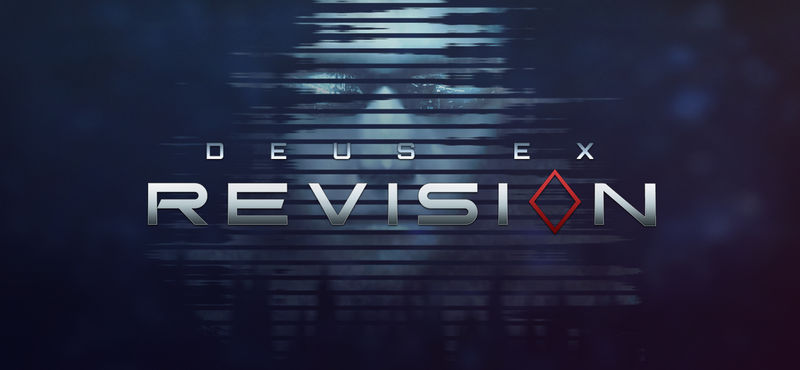
There are now more options for actions in shelters.
Fascinating chatter
On the other hand, the process of persuasion, observation of reactions and selection of replicas has become even more interesting. And there are more dialogues in Mankind Divided , they are better, longer, more complex and varied. Each quest character here loves to chat about life and the current political situation. And even at the first meeting with one of the leaders of the CPA, thug Viktor Marchenko, who resembles a cyber-orc in armor, you can have a fascinating conversation with him about non-resistance to evil by violence, about terrorism and revolution. nine0033
Leaving aside some irony, let’s admit that in this way Mankind Divided raises really serious, topical topics — much more topical than the problems of transhumanism. It may even seem to some that the authors overdid it here, confusing the game and the book, and the plot gets bogged down in constant dialogues, reasoning and reflection.![]() But the series has always been distinguished precisely by smart scripts, where the main thing is not dashing Hollywood directing (from this point of view, Mankind Divided is nothing special), namely that dialogues, assessments and reasoning.
But the series has always been distinguished precisely by smart scripts, where the main thing is not dashing Hollywood directing (from this point of view, Mankind Divided is nothing special), namely that dialogues, assessments and reasoning.
If we have any complaints about the script, it’s for the ending, openly interrupted in mid-sentence, which clearly leaves the groundwork for continuation. And for the fact that the image of Adam Jensen, unlike the same Geralt of Rivia, lacks «living life», some kind of personal nerve, anguish. Why does he climb into all holes, how does he relax, how does he spend time with friends and what is hidden behind these black glasses? Jensen acts too mechanically, reminiscent of a character in a book/game/movie, invented for specific ideas. nine0033
The beginnings of «crafting» appeared in the game: you can collect various useful items from scrap metal.
Better, bigger, more alive
The mechanics, as well as the presentation of the plot, have not changed much compared to Human Revolution .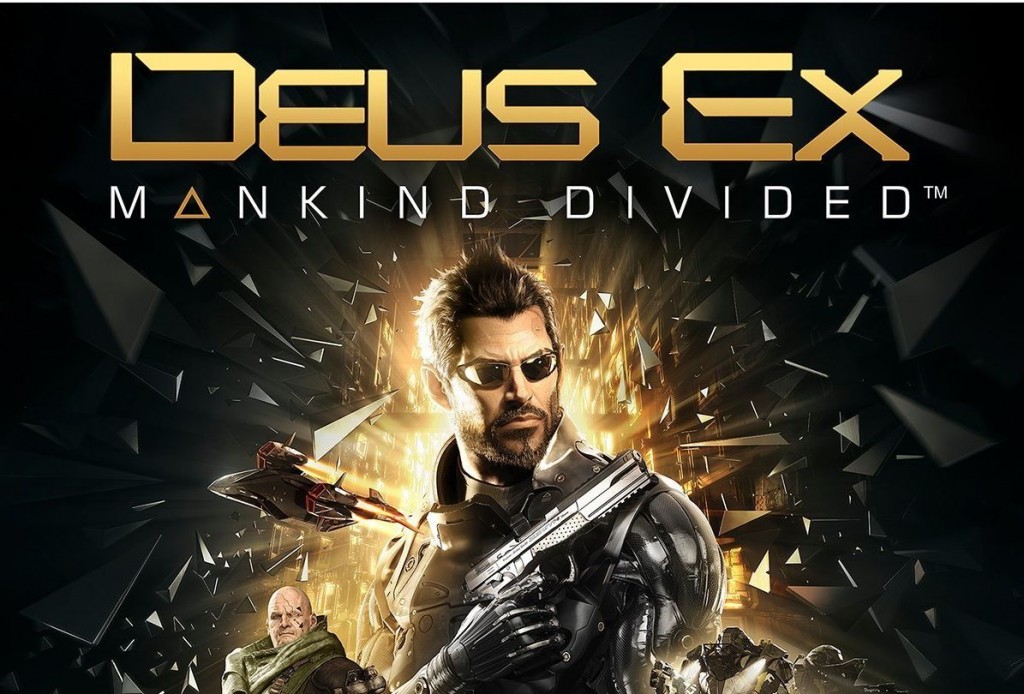 All the same combination of action and stealth, crawling through ventilation, hacking computers and electronic locks through familiar mini-games, searching for passwords and access codes. And all the same Praxis packages that we receive upon reaching new levels in order to open a new augmentation or improve an existing one. nine0033
All the same combination of action and stealth, crawling through ventilation, hacking computers and electronic locks through familiar mini-games, searching for passwords and access codes. And all the same Praxis packages that we receive upon reaching new levels in order to open a new augmentation or improve an existing one. nine0033
But in addition to all this, the authors made point and very correct additions and add-ons. First and most importantly, they really made it possible to avoid open clashes in the vast majority of cases, even at the end of story missions, when we are already habitually waiting for an obligatory date with the «boss». Conduct the conversation correctly — not only will they not attack you, but they will also share important information. Otherwise, yes, you will have to fight.
For those who prefer a stealthy (that is, correct) passage, this somewhat devalues the appearance in the game of experimental augmentations aimed specifically at battles, such as the widely advertised Titan subcutaneous armor or a flip nanoblade.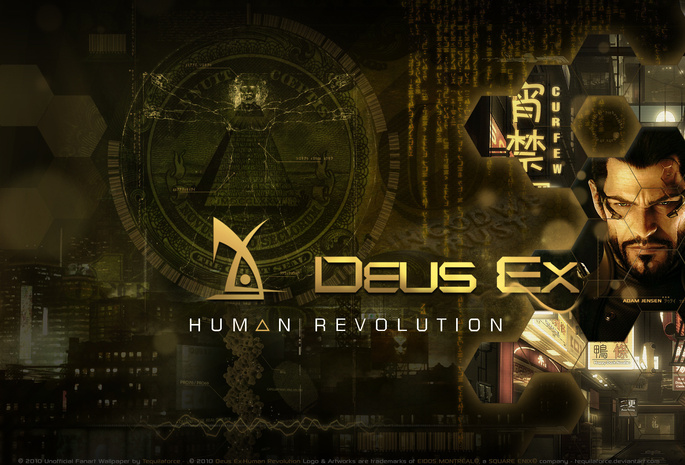 nine0033
nine0033
On the other hand, the very presence of new interesting modifications is pleasing, among which there are those designed specifically for stealth and non-lethal passage (like the Tesla shock gun built into the hand, capable of knocking out up to four targets at the same time after an “upgrade”). It is also important that up to a certain point (until you complete an important quest) you cannot install several experimental implants at once — you have to turn off some forever so as not to overload the energy system of our cybernetic agent. This introduces an additional element in the process of choosing tactics for passing. nine0033
In any case, both stealth connoisseurs and those who are not against open combat will appreciate how much more convenient the cover system has become. It allows you to correctly assess the movement of enemies on the level (and even quietly knock them out through an obstacle), and deftly move over long distances between walls and boxes in the middle of a dashing battle.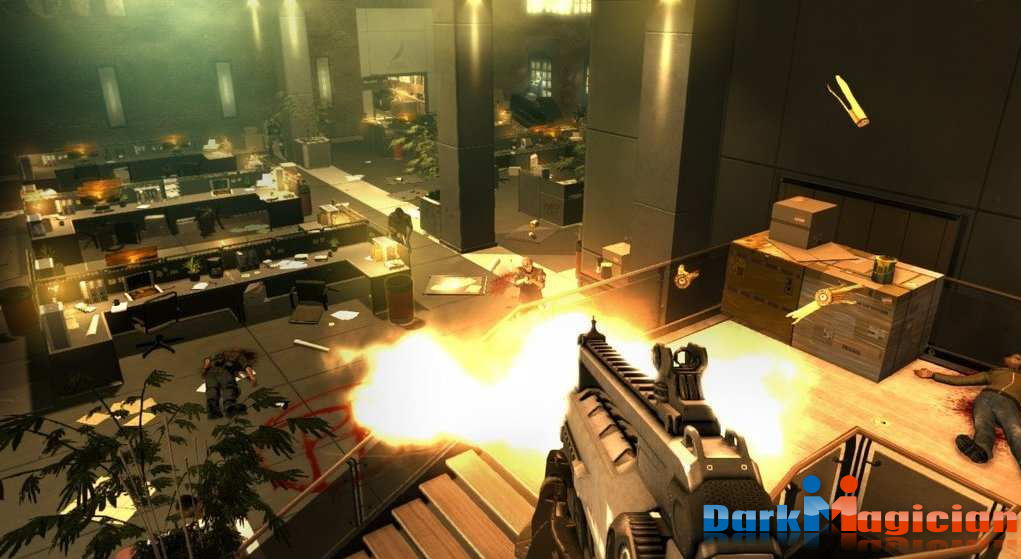 Well, in general, everything here is more convenient, more comfortable for the game — combat, control, interface, hacking process.
Well, in general, everything here is more convenient, more comfortable for the game — combat, control, interface, hacking process.
The game has been translated and voiced into Russian. True, sometimes the young here for some reason speak in older voices. Yes, and they swear almost more often than in the third Witcher. nine0003
Deus Ex: Mankind Divided is an augmented, cybernetically enhanced version of Human Revolution with very correct augmentations. More scale, freedom, interesting tasks, dialogues and adult themes, more stealth, weapons and implants, more beautiful and detailed graphics, everything else is more convenient. At the same time, the passage has not become easier — on the contrary. This is a great modified Deus Ex — and only competitors in the fight for the title of the best game of the year should be afraid of it. nine0033
Pros: a fascinating story that raises difficult and relevant topics; freedom of action and decision; a large, detailed city; interesting side quests; new augmentations that are not imposed and do not spoil, but complement the game; convenient system of shelters; more opportunities for stealth and non-lethal passage; great graphics, music and atmosphere.